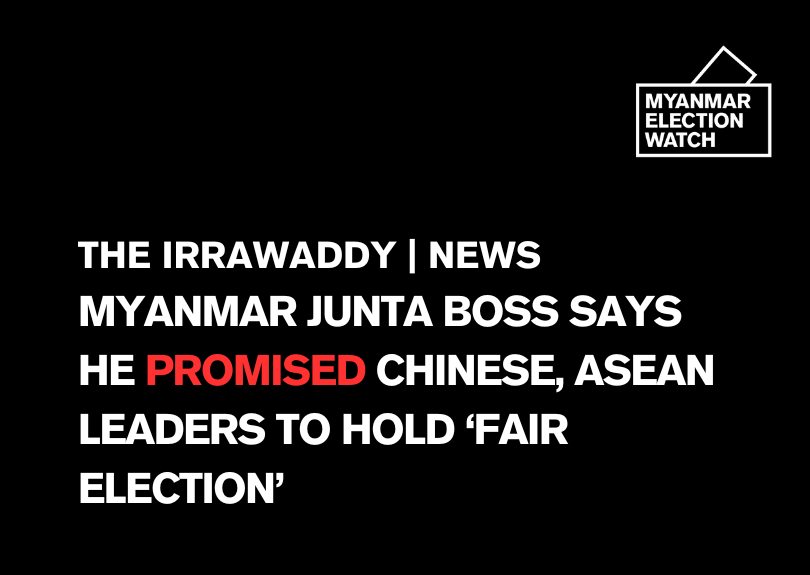Junta boss Min Aung Hlaing said he promised during his recent visit to China to hold a free and fair election that would be monitored by international observers.

Link to the Source HERE.
Addressing the first meeting of his cabinet on Tuesday since his return from China, Min Aung Hlaing said he told government leaders from China and fellow Association of Southeast Asian Nations (ASEAN) countries that he would organize a free and fair election and invite international observers to witness it.
The junta chief attended the 8th Greater Mekong Subregion Summit from Nov. 5-10 in Kunming, Yunnan Province on his first visit to China since the 2021 coup. The summit was joined by the prime ministers of Cambodia, China, Laos, Thailand and Vietnam.
Of the prime ministers that attended the summit, he was the only one with whom Chinese Premier Li Qiang held separate talks, Min Aung Hlaing—the self-appointed prime minister of Myanmar—boasted at his cabinet meeting.
Li promised assistance with planning the election and census-taking, he said.
He said he had also informed the prime ministers of the four ASEAN countries in attendance about his regime’s preparations for “free and fair elections” and the invitation to international observers to ensure the poll’s transparency. His counterparts spoke in support of the poll plan, he added.
The junta boss further stated that the census was more than 63% complete and estimated that it would be fully conducted by the end of the year. He said political parties have been allowed to register for the poll, and that a proportional representation system would be introduced in national and sub-national parliaments to ensure the inclusion of members of ethnic groups and representatives of the various strata of society.
Min Aung Hlaing has repeatedly promised a fresh poll since seizing power in a coup in February 2021, citing fraud in the 2020 general election decisively won by the National League for Democracy (NLD). Nearly four years later, the regime has not yet set a date for it. It has however hinted that the poll is likely next year.
Although the junta has stated it will invite international observers, democracies including the United States have expressed skepticism about the credibility of any poll organized by the military junta.
Critics argue that the junta’s planned election is merely an attempt by the Myanmar military to maintain its grip on power with support from China, India and Russia, but lacks broader domestic and international recognition.
Though the census is supposed to be a nationwide process, the regime has struggled even to cover all of Yangon, let alone the many conflict zones elsewhere in the country.
Meanwhile, the accuracy of the census has been compromised by the personal safety risks faced by both the junta enumerators and the census respondents. Enumerators did not bother to go door to door, and did not ask all the questions on the census questionnaires. Many respondents said they did not provide correct answers because of their distrust of the regime. The resulting voter lists, which the regime will compile based on incomplete and incorrect census data, can’t be accurate, opponents say.
The poll, according to Min Aung Hlaing, will only be held in stages for security reasons. But ongoing armed conflicts in many parts of the country and the fact that large swathes of territory have been seized by anti-regime groups mean elections will only take place in some areas.
The regime has disbanded the NLD and Shan Nationalities Democratic Party, and the junta’s electoral law favors the military’s proxy Union Solidarity and Development Party.
At the meeting, Min Aung Hlaing vowed to bring about a credible poll and credible parliament, but as usual, he could not help vilifying the NLD, whose government he ousted after the 2020 poll.
He accused the NLD’s Central Executive Committee members of being responsible for the alleged fraud in the 2020 election, claiming it was a coordinated effort rather than the actions of individuals.
In their Nov. 20 editions, the junta’s newspapers said details of the “fraud” in the 2020 poll would be reported in five languages—Burmese, English, Chinese, Russian and Japanese—on the website and mobile application of the junta-appointed Union Election Commission.
